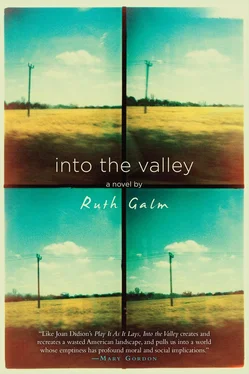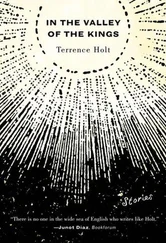“Did you need something else?” The teller was beside her, smiling with a ghostly white lipstick B. had not noticed the first time. “I’m going on my break.”
“No, I’m sorry. I just. . I was a bit lost. . I’m not sure. .” B. zeroed in on the girl’s teeth. They were small and straight and attractive. She looked from the teeth to the clean desks to the beige-colored carpet.
“We probably have a map here somewhere.”
“No. I just need to rest. Thank you.” She spoke very slowly to the teeth.
The girl nodded sympathetically, but B. picked up in a corner of her eye the silver badge and white shirt of the security guard.
“It’s nice and cool in here,” the girl said, nodding. “It can get outta sight, especially for someone from the city. Would you like a glass of water?”
“No, really, I’m fine. Thank you.” The teeth and the lines and the orderliness doing their work now. The cool expansive feeling returning, her pulse relaxing.
“Well, take your time. And thank you for banking Delta Savings and Loan.”
After the teller walked away, B. saw the security guard still watching her. She waited a few moments before she stood up, leaning against the slick beige wall. She exited as casually as possible out the glass door, the cool expansiveness pouring through her. She sat for a few more seconds in the car, noting the silver badge glinting behind the glass. This time she drove carefully, following the main street straight to the highway. Then she gunned the engine, eye on the rearview mirror.
At one time B. had wondered whether marriage was the way things would “work out.” The girls at her small women’s college had come to find husbands; a few had ambitions for publishing jobs or teaching positions, but most came for a ring or a promise, and sometimes they deliberately got pregnant. B. had not railed against or even chafed at this reality. It had seemed an acceptable fact. But remote, like growing old, something she could navigate later. She’d simply enjoyed reading her textbooks, about floral imagery in Japanese art or the brutal deaths of Roman emperors. She dated a few boys from the men’s college, all perfectly fine, but the prospect of the dates always seemed more entertaining for her roommates, who dressed her and fixed her makeup and hair and talked about the boy’s height or skin and told bawdy jokes about penises. B. liked to be touched and kissed by the young men but she did not feel in their brief interludes particularly engrossed by them. She could never overcome, the way her classmates seemed able to, her discomfort at the gap between what she was thinking and what she was supposed to say. (A boy had once told her “You seem like a real fun girl” at the exact moment she had been wondering whether Bloody Queen Mary of Scots still had feeling in her neck between the first and second hacks; she’d nodded to the boy, not wanting to embarrass him.) One boy wanted to see her often. They had a date at a soda counter and one at a movie where his large knee brushing hers made her groin surge; they kissed for long periods. After a few more dates no different than these, the boy proposed. He did not seem bothered by the fact that they had spoken probably an hour total to each other, that he had no idea what she’d really thought of the movie (sentimental) or why she typically avoided soda counters (a tendency to spill). She lied that she was already engaged and the boy had called her heartless. She’d watched his slumped shoulders with relief as he walked away.
But a few years later, living in Boston and working as a secretary, no longer studying Japanese art or Roman emperors or thinking about Bloody Queen Mary of Scots, B. wondered if the presence of another person every day could keep away the tightening and spinning in her skull. She looked up the boy who’d proposed and invited him for a drink. They saw each other for several weeks, but each night after he fell asleep the carsickness resurfaced as it had before, the boy’s warm and prone body like an island unto itself, and she reeled in the dark. She broke it off with him again and this time he spat at her. After that she no longer wondered if marriage was the answer.
And so it had all become a haunting, really, the idea of things “working out.” As if she were missing the other half of a position. As if she had gotten herself to a ledge with no intention of leaping off.
On the map from the gas station, they were a few jagged circles alone, disconnected. She took the freeway in her hurry to get there.
It was private land, she understood. She would not be allowed to drive in the buttes. But she felt suddenly desperate to see their desultoriness up close. Geological anomalies, mountains in the middle of a valley. She felt some aspect of them must elucidate something, must point her in a direction.
To her right the shoulder was a streak of yellow grass dotted with trash. On and on, unvarying. Still, in this unending line, B. found herself waiting for something to appear. How could she be waiting? There was no sign that anything but the line of yellow grass would continue. This waiting, she sensed, was part of the problem. The feeling that if she just waited, somehow things would be resolved. Descend on her, materialize, make themselves clear. She felt programmed for it, she realized, as if to wait had been implanted in her body before she was born.
She sped up the car.
A crew of orange-vested men flashed by in the yellow line, picking up the trash. The blip of their faces pained in the heat. On another stretch the thump of a dead animal. The freeway streaming on. In her head a nursery rhyme drummed: Seventeen, eighteen, maids in waiting.
Her eyes watered from the smog. She rolled up her window. She reached out to touch the checkbook, but the ostrich-skin purse was on the floorboard out of reach.
The buttes when they finally rose in her windshield were ugly. Mounts of yellow brown in the haze, bare land with a few shrubs and oaks in its crevices. She drove on, determined. She reached the base and pulled onto a dirt road. At a locked gate not far in she parked. She got out; the dead engine pinged. At the gate, she climbed awkwardly over in her dress, stumbling in her heels as she jumped down. She followed along barbed wire, the hillside smelling of dry mustard and dust.
The sun blazed down. There were no buildings anywhere. Bits of trash from other trespassers, a beer bottle, silver pull tabs, crumpled brown bags. The silver tabs were flashing a message maybe. Thirteen, fourteen, maids a-courting, fifteen, sixteen, maids in the kitchen. She watched the tabs, then gave up and walked on.
She left the road and began hiking up the hillside. There was “chaparral”—this one classification of tangled green bushes so foreign to her when she came west that she’d had to learn the name — and oak trees scattered and stooping. The powder-blue dress chafed at her underarms. Her heels were blistering. She took off the shoes. The dead grass and rocks pricked her feet but she could not put her throbbing soles back in the heels.
She felt whatever she was looking for must be farther on.
The top was not far. The sun fell in one pure burn into her skin. Finally she collapsed under one of the oaks, throat dry, too hot to continue. The flatness of the valley spread for hundreds of miles below, the mountains in the far distance like figments behind the haze. She could not make out any message, no revelation in any of it. She leaned against the tree. The feeling of solitude, at least, was pleasurable. No one would disturb her here. She closed her eyes.
In her mind, two women swirled. The first from a party, the only contact she’d had with “the scene.” A man in line at the supermarket had asked B. whether the grapes in her basket were picked by Mexican migrant workers, and when she could not say they hadn’t been, he’d begun declaiming about seasonal labor movements and the exploitation of brown-skinned “proles” by capitalist dictators (“in this so-called ‘democratic’ society”) and then asked her to coffee. He had a wisp of awful breath and a slight droop to his left eye. Perhaps out of curiosity, or to occupy the hours, as with Daughtry, she’d accepted. When they met he did not ask her thoughts on anything. He listed his work in the service of the poor and downtrodden and disdained the “bourgeois café” where he had suggested they meet. He invited her to a party. The breath was worse, of a person who never flossed, whose teeth held rotting pieces of food. But she thought of the basement apartment and the long weekend ahead and again she accepted.
Читать дальше










